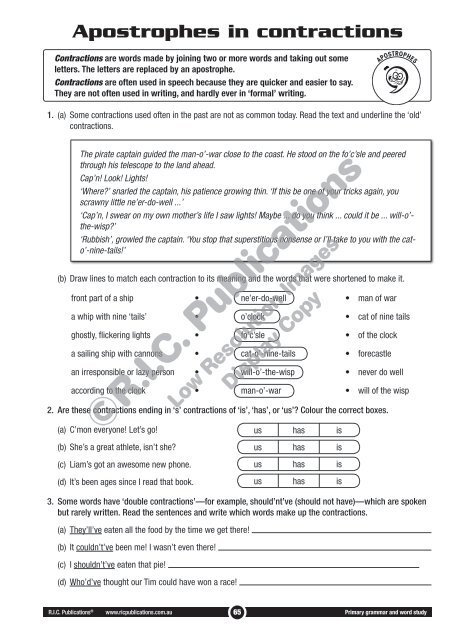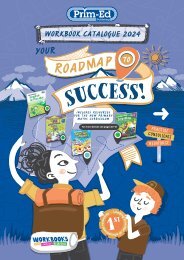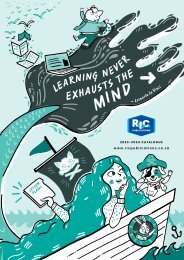RIC-20248 Primary Grammar and Word Study Year 6 – Punctuation
You also want an ePaper? Increase the reach of your titles
YUMPU automatically turns print PDFs into web optimized ePapers that Google loves.
Apostrophes in contractions<br />
Contractions are words made by joining two or more words <strong>and</strong> taking out some<br />
letters. The letters are replaced by an apostrophe.<br />
Contractions are often used in speech because they are quicker <strong>and</strong> easier to say.<br />
They are not often used in writing, <strong>and</strong> hardly ever in ‘formal’ writing.<br />
1. (a) Some contractions used often in the past are not as common today. Read the text <strong>and</strong> underline the ‘old’<br />
contractions.<br />
The pirate captain guided the man-o’-war close to the coast. He stood on the fo’c’sle <strong>and</strong> peered<br />
through his telescope to the l<strong>and</strong> ahead.<br />
Cap’n! Look! Lights!<br />
‘Where?’ snarled the captain, his patience growing thin. ‘If this be one of your tricks again, you<br />
scrawny little ne’er-do-well ...’<br />
‘Cap’n, I swear on my own mother’s life I saw lights! Maybe ... do you think ... could it be ... will-o’-<br />
the-wisp?’<br />
‘Rubbish’, growled the captain. ‘You stop that superstitious nonsense or I’ll take to you with the cato’-nine-tails!’<br />
(b) Draw lines to match each contraction to its meaning <strong>and</strong> the words that were shortened to make it.<br />
front part of a ship • ne’er-do-well • man of war<br />
a whip with nine ‘tails’ • o’clock • cat of nine tails<br />
ghostly, flickering lights • fo’c’sle • of the clock<br />
a sailing ship with cannons • cat-o’-nine-tails • forecastle<br />
an irresponsible or lazy person • will-o’-the-wisp • never do well<br />
according to the clock • man-o’-war • will of the wisp<br />
2. Are these contractions ending in ‘s’ contractions of ‘is’, ‘has’, or ‘us’? Colour the correct boxes.<br />
(a) C’mon everyone! Let’s go!<br />
(b) She’s a great athlete, isn’t she?<br />
(c) Liam’s got an awesome new phone.<br />
(d) It’s been ages since I read that book.<br />
3. Some words have ‘double contractions’—for example, should’nt’ve (should not have)—which are spoken<br />
but rarely written. Read the sentences <strong>and</strong> write which words make up the contractions.<br />
(a) They’ll’ve eaten all the food by the time we get there!<br />
(b) It couldn’t’ve been me! I wasn’t even there!<br />
(c) I shouldn’t’ve eaten that pie!<br />
(d) Who’d’ve thought our Tim could have won a race!<br />
©R.I.C. Publications<br />
Low Resolution Images<br />
Display Copy<br />
us has is<br />
us has is<br />
us has is<br />
us has is<br />
R.I.C. Publications ® www.ricpublications.com.au 65<br />
<strong>Primary</strong> grammar <strong>and</strong> word study


















